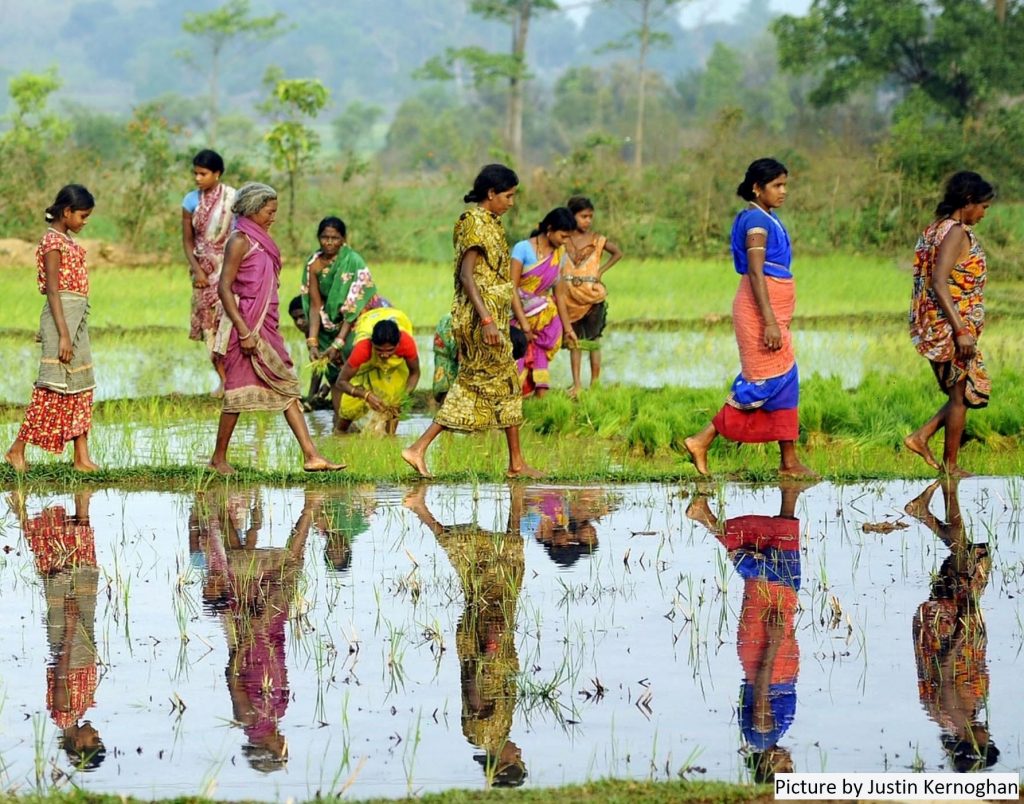Lockdown in rural areas

The question that is asked everywhere in India: how does a complete lockdown work in remote areas? Where people live in small shelters and have to leave their huts for every personal need, whether it is cooking food or basic hygiene. Many people don’t have toilets or running water inside of the house. If they want to wash hands, they have to go outside. Some of our kantharis live and work in these regions away from the centre of the media attention.
Neeraj, a 2016 kanthari graduate, lives in Bihar, one of the poorest states in India. He founded Khetee, a self-sustaining farmer’s commune. He is worried and for someone who doesn’t talk much, he explains the situation in a flood of words: “We would have enough to eat but what happens if we are not allowed to go out into the fields to harvest and to feed our livestock.”
“Officials chase and beat those who are not obeying the lockdown. They cannot lock villagers in their houses. However, we would be able to stay safe and survive if we were given the opportunity to do so.”
Neeraj explains, how daily laborers from his region now struggle with their daily needs. And he is surprised how little they know about Corona. Only one week ago, many in his village still had no idea of what was happening outside of their world.
“There is no media, no television or radio, so we ordered the ‘Town-Cryer’ from old times to inform the villagers.” A friend of Neeraj was wrapped in protective clothes and armed with a drum as he walked through the villages and shouted: “protect yourself, wash your hands! A main issue that the locals face is a lack of water, soap and there are no facemasks”
But protection is more than necessary because many Biharis just arrived from the first hotspots of the Corona outbreak, from Kerala and Maharashtra. They were the lucky ones that still were able to travel on train and/or buses before the lockdown started.
“We need spaces for them to be quarantined for 14 days. The local empty school was prepared for this; however the building is locked and no caretakers are to be found anywhere. Now they directly go and stay with their relatives. Neeraj took to action, together with volunteers they prepare isolation stations, make facemasks and produce liquid soap.
Sadhana, a 2017 kanthari graduate lives and works in a rural area in Odissa. She is the founder of Sadhan, an organization that empowers tribal women who have suffered from domestic violence. When I asked her, how she personally copes with the situation, she continued to speak about her beneficiaries. She was especially worried about the tribal women who feel that the virus is nothing more than a myth. “Yes, people are astonished that suddenly everything seems to come to a standstill, and there is no more work and income. The fact that now families don’t have anything to eat, is somehow not at all linked to this disease.”
“And, how are you?” I insisted, she stopped and after a long pause she said: “I am hungry!”
Sadhana is divorced, and leads a woman headed household. Every household should receive around 7 Euros to buy the most essential goods. But without the required ration card Sadhana, Jyotshna, another kanthari graduate who is also divorced and runs a similar tribal project in a different area are missing out.
Kabir, a 2018 kanthari graduate, lives in a rural area in Bangladesh. “The biggest Problem he sees is that people escape the pandemic and, in large numbers flee the capital and return to the villages. Many of them could unknowingly be carriers of the virus.” he said “This would be the perfect way to spread the virus throughout the country. Like in Indian remote areas, there seems to be no realistic understanding, about how to protect oneself. Our religious leaders said: because of your faith, you will be safe.”
Kabir is the founder of Oniruddah Bangladesh, an organisation that takes care of youth and adults with mental disabilities. In times of home quarantine, families with mentally challenged members have an additional struggle. Many have the habit of walking around in their villages. Socializing is an important part of feeling integrated. How can the dangers of the Corona pandemic be explained to them? “We can’t lock them in the homes without giving any explanations, it is a very difficult situation.”
Kabir is currently taking care of his sick mother and his mentally challenged older brother. He is constantly talking to him and trying to make the drastic changes that are happening everywhere understood.
Paul and I are living app 12 km from Trivandrum city, in a comparably rural part of Kerala.
Compared with our kantharis, we are still safe. We use the time well; we message and speak with many kanthari alumni and we observe how in times of crisis more people become interested in kanthari. In contrast to our expectations, more applications for the postponed program, from new countries like Angola, Zambia, Somalia and others have come in.
It seems that in times of Corona more and more people become aware of what is really important: We need enough to eat, we need to stay healthy and we need to stand together in solidarity.
